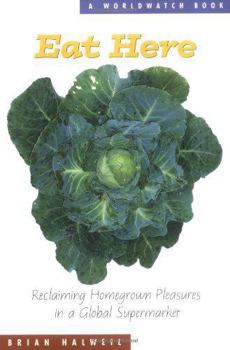Eat Here: Reclaiming Homegrown Pleasures in a Global Supermarket
Eating locally is a growing movement that is good for your health--but even better for the planet. Everyone everywhere depends increasingly on long-distance food. Since 1961 the tonnage of food shipped between nations has grown fourfold. In the United States, food typically travels between 1,500 and 2,500 miles from farm to plate--as much as 25 percent farther than in 1980. For some, the long-distance food system offers unparalleled choice. But it...
Format:Paperback
Language:English
ISBN:0393326640
ISBN13:9780393326642
Release Date:November 2004
Publisher:W. W. Norton & Company
Length:236 Pages
Weight:1.60 lbs.
Dimensions:0.7" x 5.5" x 8.2"
Related Subjects
Agricultural Sciences Biological Sciences Ecology Engineering Science & Math TechnologyCustomer Reviews
5 ratings
A Local Food Action Plan
Published by Thriftbooks.com User , 15 years ago
Many Americans do not understand that their food purchases have an impact beyond their waistlines. "Eat Here" is both a wake up call for such people and a guide for all concerned citizens on how to improve the world's broken food system. It argues that changing the food system is anything but a pipedream and then sets out a clear path to that end. In the first part of the book, author Brian Halweil clearly identifies the many failures of our current way of eating. The long distance transport of food is a major contributor to climate change. Instead of the tastiest fruits and vegetables, supermarkets stock those most amenable to shipping. Family farms are disappearing at an alarming rate, killing rural communities in the process. Water supplies and fisheries are contaminated by agribusinesses whose poor crop rotation practices ensure that much of the fertilizer they apply cannot be absorbed into the soil. The list goes on. Halweil then lays out a cogent plan for remaking the system. The key for him is rebuilding markets for local food, and he suggests a partnership between consumers and local farmers to achieve this. The first step is for consumers to start demanding local food with their voices and their dollars. This argument, in my view, is "Eat Here's" biggest strength, for it emphasizes that consumers, who often see themselves as anonymous actors in a macroeconomic world, can be powerful agents of change. For those concerned about the money cost of food (that is, nearly everyone in these tough economic times), Halweil makes two important points. First, many local products are cheaper than their national counterpart is because local farming usually cuts out the middleman and fuel costs. Second, if consumers start demanding local products, even goods that are more expensive than their national counterpart will become cheaper as more suppliers enter the market. Halweil then turns his attention to farmers. He argues that to ensure their viability, small farmers must start seeing themselves as entrepreneurs and seize the sizable post-harvest profits available in their food. (The most astonishing fact in the book is that for every dollar spent on bread in the U.S., farmers get 6 cents, the same amount as the company that makes the wrapper. The rest is going to firms up the distribution chain.) The money in agriculture is in what happens after a product leaves the farm, and Halweil offers suggestions to farmers on how to capture this money. In short, the answer lies beyond the farmer's market in farmer-owned facilities to process, distribute, and sell agricultural products. "Eat Here" is a thoughtful take on a very important problem. Even those who already take their food seriously would benefit from reading it.
A Must Read!
Published by Thriftbooks.com User , 16 years ago
Well, this book was certainly interesting...but not so engaging for me as coming home to eat. There is a whole lot in this book that I was not aware of before reading it and while I understood that eating locally was preferable...until I read this, I only had a hit of the ideas behind they why of it all. It's a fairly quick read and I do think Halweil makes a compelling case for necessity of a return to a more local food economies. I think this is probably a book that everyone should read. I give it a solid A.
must read
Published by Thriftbooks.com User , 17 years ago
This book is a must read - it should be assigned reading in classrooms. More people care where their food comes from but this goes beyond that and goes to the farmer and the other reasons why we should all care. A little education goes a long way and if we take heed we can help each other as this goes to the heart of what is community. The Walmarts and other big centers for anonymous food are the antithesis of community and their paltry attempts at throwing money at communities does not change that. The first goal is to get people to care what effects their actions and their shopping in particular have on others, both here and abroad and this addresses one part of that.
Pleasures Abound...
Published by Thriftbooks.com User , 19 years ago
This is required reading for everyone, not just farmers. It's packed with informative fact and real-life stories. A resource to aid those interested in knowing where their food originates (local is best) as well as how their food is cultivated. This book offers many suggestions to help readers find creative ways to support regional agriculture and a healthier lifestyle.
Great Job, Brian!
Published by Thriftbooks.com User , 20 years ago
This book is very well done. He not only describes the problems in the American food system, but does a fantastic job of describing international problems, something that is lacking in many books published in the US. The writing is easy to understand even though it broaches some complicated issues. If there were any weaknesses, I think it's that he doesn't cover the nutritional losses of old food enough.





